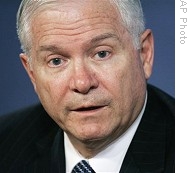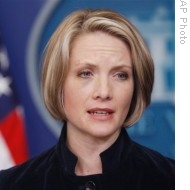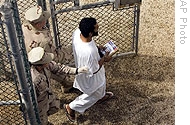voa标准英语2008-Challenges Await Obama in Effort to Close Guanta(在线收听)
 |
| Robert Gates wants to be ready if ordered to close Guantanamo detention complex (file photo) |
President-elect Obama has said he would like to close the Guantanamo detention center. But so has President Bush. And so has Defense Secretary Gates.
President Bush's Press Secretary Dana Perino pointed out recently that it's easier said than done.
"It's not so easy just to say that you're going to close Guantanamo Bay. And now in the last week or so, all of a sudden some of our critics in the media are now putting forward how complicated it would be and how difficult it will be for the next President to make these decisions," she said.
 |
| Closing Guantanamo easier said than done, argues White House Press Secretary Dana Perino, 18 Dec 2008 |
Perino is a little irritated at critics who have long called on the Bush administration to close the detention center, but now, she said, are focusing on how difficult it will be for President-elect Obama to do so.
Even at the human rights group Amnesty International - which has long argued for the prison to be closed - Anne Marie Brennan acknowledged it would be difficult.
"I think that it won't be easy, but it is a mess we've created. It's something we have to deal with. Saying that it's not easy is no reason to keep them locked away forever," said Brennan.
Three Categories of Detainees Being Held
The Defense Department has released more than 500 detainees from Guantanamo, but it still holds about 250. Some of them have been held as long as seven years. They fall generally into three categories - those who have been approved for release but no country will accept them, those who have been or will be charged with specific crimes and a third group described by Michael O'Hanlon of the Brookings Institution.
"You still have a small category of people for which you feel pretty confident you should be holding onto them but you can't even convince a military judge or jury that they're guilty. And that's part of the dilemma here," he said.
The U.S. military said that group of detainees, perhaps several dozen, cannot be tried because the evidence against them must be kept secret, or because the evidence was obtained through torture and can not be used in any court.
Anne Marie Brennan of Amnesty International is not sympathetic to that problem. "Amnesty International is opposed to preventative detention, and to arbitrary and indefinite detention. So Amnesty International believes that the detainees at Guantanamo Bay either need to be released and resettled, or to be tried in fair courts, such as a U.S. federal court."
But at the White House, where a president would be held responsible if released detainees return to terrorism, Dana Perino said Amnesty's 'hold them or try them' approach is not realistic.
 |
| Guards escort a Guantanamo detainee at Camp 4 detention facility in Guantanamo Bay, Cuba, 18 Nov 2008 |
"About seven percent of the detainees that we returned to their home countries have actually struck again. Some have been recaptured. One of them could not be recaptured because he was a suicide bomber who killed 40 people in Mosul," said Perino.
There is a debate now among experts about what to do with the detainees if President-elect Obama orders the Guantanamo detention center closed. Officials from U.S. states that host the main maximum security prisons have said they do not want the terrorism suspects brought there, regardless of the legal structure created to hold and try them. But experts said if there is a decision to close the Guantanamo center, there may be no choice.
Some said the detainees should be put into the regular U.S. civilian prisons and courts system. Others supported the current controversial system of military commissions, which enables the government to hold detainees indefinitely before trial, or with no trial, or even if they are acquitted.
New System Needed?
And some said a new system is needed - some sort of special National Security Court - that would provide fairer trials than the military commissions but would protect government secrets. That would require congressional action, which Secretary Gates has called for, without specifying exactly what he thinks a new law should say.
Michael O'Hanlon of Brookings also wants a new system. "You've got to feel comfortable that you can keep behind bars some very dangerous people at a time when we continue to be attacked around the world by extremists of this inclination," he said.
But O'Hanlon also said it might be necessary to release at least some of the people the U.S. military says are dangerous, particularly if the new president decides to use regular civilian courts to try them.
"Perhaps we're going to have to just get up our courage, the way our Iraqi allies have, and deal with the possibility of some released detainees being dangerous people, and that being preferable, despite the danger, to a system in which we seem to flout our own legal and constitutional and human rights standards. But it's a tough one," said O'Hanlon.
That is one of the questions the Pentagon staff is working on for Secretary Gates, and that President-elect Obama will have to face starting in January.